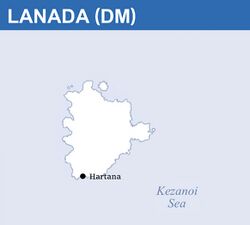Lanada
Lanada | |
|---|---|
Territory of Delamaria | |
 | |
| Country | Delamaria |
| Capital City | Hartana |
| Government | |
| • Body | Lanada Territorial Assembly |
| • Territorial Governor | Terrence Arthine (Lanada Democracy Party) |
| • Lt. Governor | Charles Martin |
| • Representative to the House of Delegates | Jeramy Schatz |
| Population | |
| • Total | 201,200 |
| Website | www.LanadaGov.gov.dm www.VisitLanada.co.dm |
Lanada, formally the Territory of Lanada, is an Overseas Territory of Delamaria. Distinct from a State, it has no voting representation in the House of Delegates or the Senate, though advocacy groups have made strides in the past, most bills to make Lanada a state have failed.
Geography
Lanada has a hot and tropical climate, with many white sand and volcanic beaches. The territory is home to two active volcanoes, Mt. Carcan and Kaiathule. Lanada is covered in 'green mountains', with the few flat lands located along the coast bein ghome to the majority of the population.
History
Humans are first thought to have arrived in Lanada in 945 AD, ethnically related to native peoples of Maranesia. The Kingdom of Kaianule was established between 1234 and 1365, with a small population and a fishing based economy. The island nation was discovered by Europan explorers in 1577, and named Lanada by Captain Georges Lanada.
By 1880, The Kingdom of Kaianule was home to many Europans and Delamarians, who were involved in the island's sugar and mining industry. Kaianule was initially open to these new businesses, providing many new jobs to locals, and building critical infrastructure. The Conover corporation was heavily involved in the sugar industry, and later became involved in politics on the island. In 1882 The Kingdom attempted to pose restrictions on companies such as Conover, which lead to many not recognising the authority of the Kaianule, and then Conover Chairman, Richard Conover, wrote to $NAME, then President of Delamaria, to intervene. The Delamarian Ambassador to Kaianule, Christopher Frone, organised two Delamarian naval ships to anchor in the port of Hartana, and deliver an ultimatum to then King Kalani Har to agree to the Accord of Montmaine, a document that would cede foreign owned lands to Delamaria, or face a military incursion. The King refused immediately, which lead to Delamarian troops occupying the Royal Palace, and putting the king under house arrest.
A few months later the Senate of Delamaria voted to annex Kaianule, and change its name to The Territory of Lanada. Immediately several military bases were established in the Territory, including the Satterlee Air and Naval Base, the largest military base operated by Delamaria.
In the 20th century, many wealthy Delamarians bought vacation homes in Lanada, along it's beaches. In 1932 the son of King Kalani Har, Wanali Har, was given his father's former palaces and some lands, which were seized during the annexation, to stop them from endorsing an independence movement. The Har family now own Delamaria's largest resort chain, Gold Sands Resorts. In the 1950s Lanada became a major tourist destination, with many hotels being built along the coast, and a large wave of immigration, largely consisting of military veterans who had been stationed in Lanada, came to the newly built suburbs of Hartana.
In 1989, President Robert Conover, a descendant of Richard Conover, formally apologised for any attacks on Lanada and its people. Today Lanada has no voting representation in the Commonwealth Congress, but has been allowed to have its own Government, similar to that of a State of Delamaria, and the ability to vote in Presidential Elections. Lanada has continuously called for statehood since its becoming a territory, with the 2016 Liberal Presidential Candidate, Stephen Carcan, having Lanada's statehodd as a part of his campaign.


